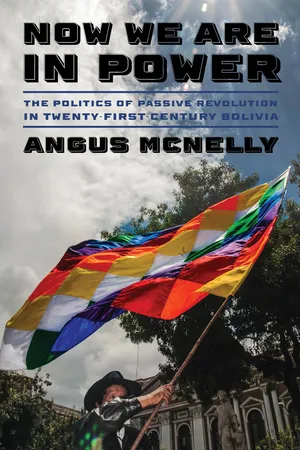
eBook - ePub
Now We Are in Power
The Politics of Passive Revolution in Twenty-First-Century Bolivia
- 240 pages
- English
- ePUB (mobile friendly)
- Available on iOS & Android
eBook - ePub
About this book
During the first decade of the century, Evo Morales and other leftists took control of governments across Latin America. In the case of Bolivia, Morales was that country's first Indigenous president and was elected following five years of popular insurrection after decades of neoliberal governance. Now We Are in Power makes the argument that the so-called Pink Tide should be understood as a passive revolution, a process that has two phases: a period of subaltern struggle from average citizens strong enough to culminate in a political crisis, which is followed by a time of reconciliation and transformation. Angus McNelly examines this movement as it unfolded and evaluates how passive revolution plays out over a prolonged crisis, ultimately demonstrating the inherent contradictions and complications of the process.
Frequently asked questions
Yes, you can cancel anytime from the Subscription tab in your account settings on the Perlego website. Your subscription will stay active until the end of your current billing period. Learn how to cancel your subscription.
No, books cannot be downloaded as external files, such as PDFs, for use outside of Perlego. However, you can download books within the Perlego app for offline reading on mobile or tablet. Learn more here.
Perlego offers two plans: Essential and Complete
- Essential is ideal for learners and professionals who enjoy exploring a wide range of subjects. Access the Essential Library with 800,000+ trusted titles and best-sellers across business, personal growth, and the humanities. Includes unlimited reading time and Standard Read Aloud voice.
- Complete: Perfect for advanced learners and researchers needing full, unrestricted access. Unlock 1.4M+ books across hundreds of subjects, including academic and specialized titles. The Complete Plan also includes advanced features like Premium Read Aloud and Research Assistant.
We are an online textbook subscription service, where you can get access to an entire online library for less than the price of a single book per month. With over 1 million books across 1000+ topics, we’ve got you covered! Learn more here.
Look out for the read-aloud symbol on your next book to see if you can listen to it. The read-aloud tool reads text aloud for you, highlighting the text as it is being read. You can pause it, speed it up and slow it down. Learn more here.
Yes! You can use the Perlego app on both iOS or Android devices to read anytime, anywhere — even offline. Perfect for commutes or when you’re on the go.
Please note we cannot support devices running on iOS 13 and Android 7 or earlier. Learn more about using the app.
Please note we cannot support devices running on iOS 13 and Android 7 or earlier. Learn more about using the app.
Yes, you can access Now We Are in Power by Angus McNelly in PDF and/or ePUB format, as well as other popular books in Politics & International Relations & Latin American & Caribbean History. We have over one million books available in our catalogue for you to explore.
Information
Table of contents
- Cover Page
- Title Page
- Copyright Page
- Dedication
- Contents
- Acknowledgments
- Introduction
- 1. Black October: Crisis, Catharsis, and Social Movement Insurgency
- 2. Building the Government of Social Movements: Transformism under the MAS
- 3. The Autonomy Movement, Two Bolivias, and the Spatiality of Passive Revolution
- 4. The Indigenous Apostle: Caesarism, State Formation, and the Figure of Evo Morales
- 5. Extractivism, Infrastructure, and the Spatiotemporal Dimensions of Passive Revolution
- 6. Contradictions, Crisis, and the End of Evo Morales
- Conclusion: Theoretical and Political Reflections on Passive Revolution
- Notes
- List of Interviews
- References
- Index